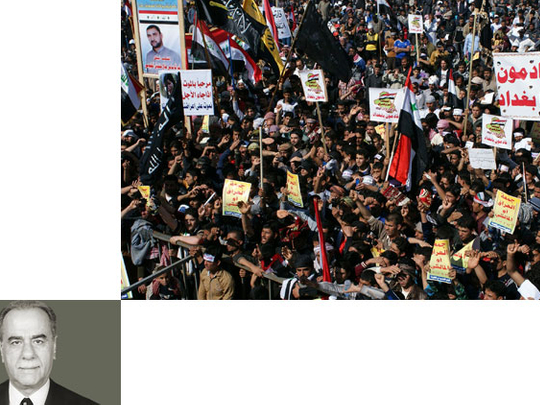
The Iraqi National Alliance is facing a series of crises. It seems that it is resorting to hardline measures because it is incapable of dealing with these issues in any other manner. The Alliance, for those who don’t know, is a cluster of parties and Shiite movements. It was established along ideological and sectarian lines and adopted political programmes, which gave precedence to sect, not nation.
This narrow vision of these political blocs has contributed to separating them from the rest of the Iraqi people. Such a myopic perspective has eclipsed their ability to view Iraq as a whole. Thus, these blocs are unable to address any crisis because of their limited vision. The components of this alliance had merged together before the 2005 elections to govern despite severe contradictions and disagreements between its different political parties.
This alliance has succeeded in retaining power for eight years with symbolic participation of other parties and alliances under the banner of a National Partnership Government. These forces and blocs were promised real partnership in the government by Prime Minister Nouri Al Maliki. Unfortunately, none of these promises were honoured — one of the most important elements that led to the current crisis. The alliance is today facing a critical situation, which threatens its political agenda.
Moreover, the alliance is unable to wriggle out of its responsibility towards the sect it represents, especially as it placed the sect in situations which harmed its interests in the Islamic and Arab world. Furthermore, the alliance’s agenda has pushed Iraq to the brink of the abyss in a manner never before witnessed in its history. The essence of the problem is that the country is being run in an incompetent manner. The government is laying down bricks that are not suitable for building a modern country. It has also chosen to implement some of the constitution’s items while overlooking other laws and regulations.
Agreements made with partners were dropped for the benefit of individual rule while many were shunned.
The crisis gripping Iraq today is getting worse every day. Both the western and northern regions have seen an outbreak of demonstrations that have turned into strikes, which have entered their sixth week in Anbar, Salahuddin, Diala, Nainava, and Kirkuk. Both Kurdish parties have also announced their solidarity with the demonstrators’ demands, which have had a timid response from the Sadrist movement.
Solving this crisis has become even harder after the increased demands due to the government’s slackness in taking them seriously. Demonstrations and strikes are the prelude to changing the political process or toppling it after the process itself became distant and far removed from the soul and essence of the constitution.
However, change has not taken place because the Alliance and the foreign powers that draw on the basic features of its agenda are still able to pull the strings of the political game. In implementing the principle of ‘supporting the sect’, they have transformed the nature of the crisis from valid demands concerning all Iraqis to a struggle regarding the allocation of every sect in decision-making.
Adding to the confusion is that whenever demonstrations and strikes take place, violence occurs, leading to the deaths of scores of innocent Iraqis in Shiite areas. This indicates that these operations are not spontaneous, but rather pre-planned to further the sectarian strife in the country.
The rigid mechanisms utilised by the Iraqi government have failed in dealing with the crisis. It has also failed in understanding the dimensions of the current problems. The inability of the government to face matters has further complicated issues as the dialogue between different political blocs has ceased. Furthermore, some political parties and blocs have sided with the demonstrators while others have sided with the government. The government, on its part has done nothing but delay solving the crisis and stalling a resolution.
Al Maliki will not back down from his rigid stance and he has not shown any flexibility towards the masses’ demands. This rigidity may be due to his confidence that internal pressures will never pose a strong threat to his political future, especially with the support he is receiving internally and from abroad.
The Alliance supports him and so does the undeclared compromise policy adopted by the US, as it does not want to be a part of a new struggle in the Middle East.
The Kurdish Alliance stressed through an announcement made by Mahmoud Othman, the longtime Kurdish politician that the US has urged Ankara to settle Kurdish oil policy issues with Baghdad and to make it clear that they — the US — are very close to Al Maliki. This is a clear indication that Washington is with Al Maliki and that his policies are backed by them.
The demonstrations and strikes are still peaceful in a manner allowed by the constitution. We hope that this peaceful trait continues but no one can guarantee that especially as the government may resort to force in an attempt to abort this movement, and the fragility of the political situation may allow foreign intervention.
Dr Mohammad Akef Jamal is an Iraqi writer based in Dubai.











